As many students started south for Spring Break, Mr. Mackenzie et al. headed east into the orient. Our very own Woods-Tower Principal was treated to the rich and longstanding culture of China while simultaneously developing familiar relations with our sister school in Qufu (choo-foo).
Mr. Mackenzie’s foray into the People’s Republic of China was completely funded by a Federal Foreign Language Grant (FLAP Grant) brought to him by the Macomb Cultural and Economic Partnership (MCEP). There was no cost for either Mr. Mackenzie or Mrs. Geyman, school counselor, who joined him on the trip. However, Mr. Mackenzie paid for his wife to join him and Mrs. Geyman for her son, at a cost around $3000 a person.
Listed as more than just a pleasure trip, the MCEP benefactors used Mr. Mackenzie as a sort of ambassador. MCEP’s goal of each of their trips to China is to build educational and economic relations, with overall intent to make Macomb County an epicenter for Chinese development.
A group of school administrators, teachers and International Baccalaureate students departed Michigan and the United States from Flint Bishop Airport at 12:00 PM on March 30.
The arduous fourteen hour trip dropped the troupe off at Shanghai Pudong Airport 6:40 PM. The next two days allowed Mr. Mackenzie to meander around Shanghai.
“Everything about Shanghai is huge,” Mr. Mackenzie noted. “It has a population of twenty-three million, three times that of New York and has the world’s largest subway system.”
However, these subways, packed wall to wall, were inordinately quiet. “We were the loud Americans on the subway,” Mackenzie joked. A mild culture shock was brought upon by this claustrophobia. “The idea of personal space is just not there. I was told the people may touch you or your hair, but I didn’t necessarily see this.” Touching others was also not a problem and, as Mr. Mackenzie would learn, sometimes required.
During one of their first subway rides, Mr. Mackenzie, along with some IB students were trapped at a far end of a subway car. A thick sea of Chinese people separated them from their exit. The impending stop was quickly approaching. “I told the kids ‘you’re going to have to push’”
The subway car stopped and the doors opened. “No one else exited,” he laughed. “So we pushed, and no one moved. We pushed again and still no movement.” Finally, Mr. Mackenzie tackled through the crowd and popped out of the car. He began pulling IB students out through the compressed throng. An on looking teacher noted it looked like “the birthing of Americans out of the subway.”
The naturally considerate Mr. Mackenzie was immediately concerned with his aggression in getting his group out of the subway. “I was afraid we might be acting out of place or being rude,” Mr. Mackenzie questioned. His worry was for naught. “When we turned back to look at the subway, all the people on the train were laughing.”
Mr. Mackenzie encountered this amiable attitude in most of the Chinese people. “They were a very friendly people and loved Americans.” China lacks much of the cultural diversity found in America and ordinary traits in our country enthrall much of the Chinese populace. “My height was a novelty, blonde hair was a novelty and they were very interested in meeting the African Americans in our group,” he quipped. “It was like we were celebrities.”
This idea was further elaborated by the impromptu photo shoots. “Sometimes I would just look down and there would be smiling Chinese people under me readying to take a picture.”
After this stay in Shanghai, Mr. Mackenzie boarded a Mag-Lev train to Qufu. These “Magnetic Levitation” trains float slightly above the rail and travel at high speeds, some upwards of 300 miles per hour. Mr. Mackenzie’s train settled for a meager 180 miles per hour. “It’s a very smooth ride, and a nice way to travel,” Mackenzie said.
Qufu, a city in the Shandong province, on the northeast coast of China is the hometown of Confucius and Wood-Tower’s sister school, Qufu High School. Their group arrived April 3rd, just around the beginning of the Qing Min Holiday.
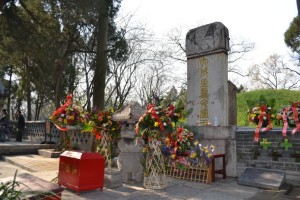
The Burial Site of Confucius in Qufu. During the Qing Min Holiday, the Chinese people will leave flowers, goods or pour of drinks at burial sites to honor the departed.
The Qing Min Holiday or Qingming Festival is a celebration with a history starting 2,500 years ago. It is a time when the Chinese honor their ancestors by visiting their graves. At the graves, they will sweep the tombs and offer food and other items. Mr. Mackenzie was lucky enough to get to experience one such ceremony at the Confucius grave site.
“I was curious as to how the Chinese felt about Americans attending such a sacred ceremony,” Mr. Mackenzie stated. “I wondered if our presence might offend them.” Again, Mr. Mackenzie learned of the overwhelming hospitality that the Chinese give to Americans. “It was explained by our tour guide that the Chinese felt it was an honor that we attended, that we would take time out to respect their traditions.”
Due to this holiday the Qufu School was out during his visit. “However,” Mackenzie said. “Because the kids were out Monday and Tuesday, they had to attend school Saturday and Sunday.”
The Qufu school was described as “Urban” by American standards: the campus was poured with cement, sans grass with a turf field as the main source of outside green. “They are not worried about aesthetics; they are more worried about education,” Mackenzie said.
Though school was not at full force at the time, Mr. Mackenzie was informed about their school day. “School goes from 7:30 AM to 5:00 PM then there is a dinner break and school resumes from 10:00 to 11:00 PM. The latter time may be optional.”
Entrance into high school is highly competitive; a test is required to be admitted. Likely due to this requirement, there are zero disciplinary problems. Aptitude tests also appear to play a large role in education, often structuring a student’s career through high school, college and beyond.
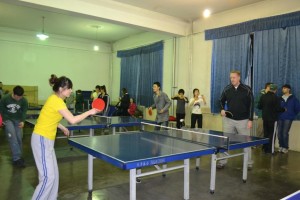
Mr. Mackenzie playing Ping Pong at the school in Qufu. This is one of the main forms of entertainment and exercise for Chinese students during their twenty minute school "recess."
Students are given a twenty minute break a day to get some exercise with their favorite pastimes being Ping Pong, Soccer and Basketball (the NBA is huge in China).
After a tour of the school, the group was treated to a formal Chinese dinner hosted by the principal of the Qufu School. The meals are hosted on a round table with a lazy susan placed in the center. Dinner procedure is very particular.
“Everything has a place,” Mackenzie noted. “The host sits at the head of the table (wherever the head of a round table is) with the most honored guest at the right. This was the MCEP coordinator. The second most honored guest sits to [the host’s] left, which is where I sat.”
A complex toasting follows with the host giving four toasts, the first honored guest giving three toasts, the next two and the final one toast. Dinner begins when four food items are placed on the lazy susan.
During the dinner, it is considered an honor for one to put food on another’s plate. Mackenzie, having a distaste for seafood, feared that fish -served head and all- would be dropped onto his plate. Luckily, he was spared from this aquatic atrocity without a need to insult his host. “I was told the honor was not my eating of whatever was put on my plate, but the act of putting it there.” Mackenzie was nevertheless relieved.
“The food was more like American Chinese food then I thought,” Mr. Mackenzie stated. “There is still sweet and sour pork. It was better than I thought too; the food was salted, but not traditionally seasoned.” He did have one complaint. “[The food] was not as hot as I expected. Even the hot sauce wasn’t really hot.”
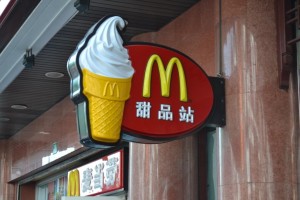
A McDonald's sign in China. The taste of their food is kept consistent worldwide, so your McFlurry and fries will be delectable anywhere.
Many of the United States fast food staples have sprouted up in the orient. McDonalds, KFC and Starbucks are quite prevalent, though a Burger King was spotted and a Pizza Hut noted. “Some students went to the Pizza Hut; it was not so good,” Mackenzie commented. “The McDonalds, however was identical. You could be blindfolded and not be able to tell the difference,” Except for said McDonalds, fast food in China is relatively cheap. “You could buy a big meal for around three bucks.”
A little out of the way, genuine Chinese marketplaces exist. Here, live chickens, pigeons, snakes and fish are killed and prepped in front of you, upon request. Also, Chicken feet are a common delicacy.
Other venues served more…exotic dishes. “More adventurous students with the tour group ate scorpion, starfish and even cicada. I was told that not even the Chinese eat these things, that they are just for the tourists.”
After the school tour and dinner in Qufu, Mackenzie took another train to Beijing. The city holds a paltry nineteen million people and is the capital of the country.
“Beijing has a more communist feeling,” Mackenzie said. One must remember that certain free market qualities and been introduced in China, the state is still unequivocally communist. “There is military everywhere.” However, this military force is unarmed, cutting the intimidation factor.
One of their main stops in Beijing was Tiananmen Square. Originally built in 1651 and then remolded in a month during the reign of Mao Zedong, Tiananmen Square is the supposed largest public square in the world, holding over 500,000 people. Most Americans know the square for the eponymous Tiananmen Square protests, particularly the one in 1989 which ended in a military massacre of an unknown number of Chinese citizens (ranging from the hundreds to the thousands). This fact is, however, left out of the average Chinese’s knowledge base to due extreme government censorship. There is no Facebook, Twitter or YouTube in China.
Their next stop in Beijing was the Great Wall of China. The Wall spans roughly 5,500 miles (for comparison the distance from Detroit, Michigan to Key West, Florida is only 1500 miles) with building beginning in the fifth century. The structures are predominantly made from stone and brick. “I just can’t imagine how they could have built [the Great Wall] back then with how big those stone blocks are,” Mr. Mackenzie was awed.
On April 9 Mr. Mackenzie along with his gang of teachers, administrators and IB students departed from Beijing Airport, homesick for the simple amenities that are all too commonplace in America. “Infrastructure is lacking in some areas,” Mackenzie said. Electricity is not assured everywhere. The sanitary systems were not always up to snuff either. “I was told not to drink the water or eat the ice.” Nevertheless, Mr. Mackenzie felt enriched by the experience. “It was a really enjoyable trip.”
MCEP is continually working on ways to create a partnership between Macomb County and China, with one future hope being a Shanghai University campus in Mt. Clemens. Look for visiting Chinese teachers, students and principals visiting our Woods-Tower community in the future.
[slideshow id=22]

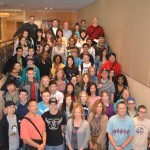
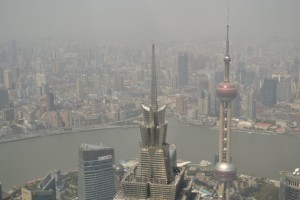
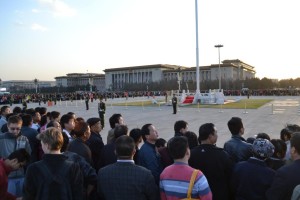
Comments are closed